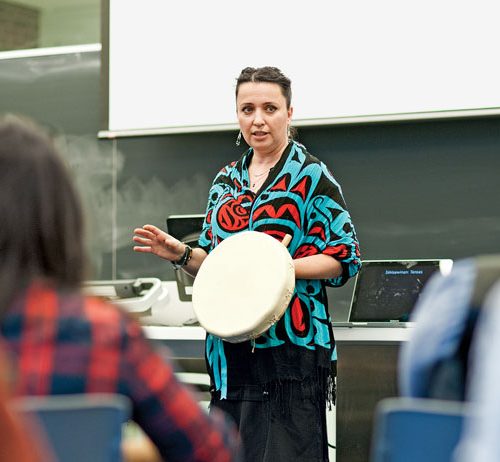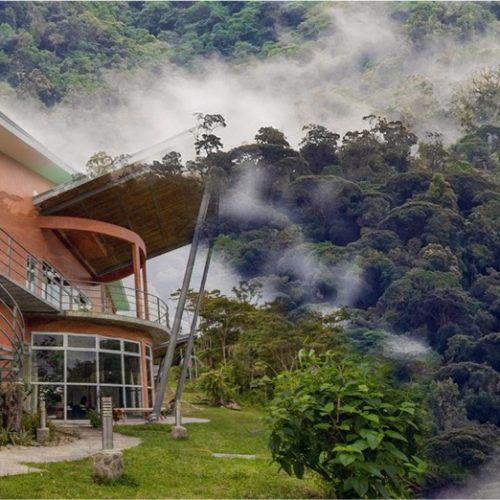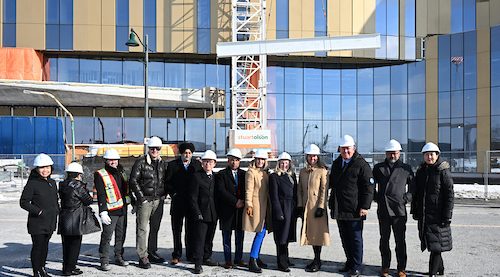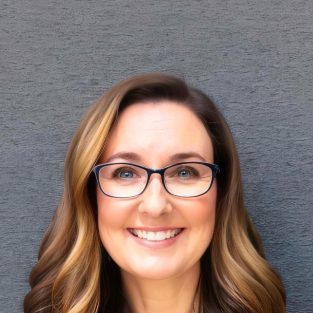In a world defined by rapid change, York University remains at the forefront of preparing students for the challenges and opportunities of the 21st century.
With leading edge programs such as work-integrated and experiential learning, hyflex courses, technology-enhanced learning, microcredentials, innovative continuing education programs and inventive pedagogical approaches, we are addressing emerging issues and market needs while providing our students with the skills and tools they need to thrive in a rapidly evolving economy.
By the Numbers
- 91.1%
- undergraduate students reported they found employment within two years of graduation
- 370
- the number of York’s OSAP-eligible micro-credential programs offered since 2020
- 37273
- undergraduate students enrolled in flexible programs (an 76% increase in 2021 and 80% increase in 2022, with 52 Hyflex courses added in Fall 2022)
- 57
- number of classroom upgrades. The Classroom Evergreening Program successfully completed renovations for 245 rooms and completed 70 Hyflex classroom retrofits
- 29%
- students enrolled in experiential education courses (7% increase since 2021)

Advancing quality education and hands-on learning
Experiential education and work-integrated learning are shaping our future leaders
York University continues to foster a seamless connection between academia and the professional world through its innovative Work-Integrated Learning (WIL) and experiential education (EE) programs. In the past year, 2,634 students have had the opportunity to participate in paid WIL experiences, while 27,249 EE placements were made available across 772 courses.
Recent statistics demonstrate that York University has witnessed a 231.55 per cent year-over-year increase in EE opportunities, a remarkable level of growth that reflects the University’s commitment to ensuring its students’ professional success. To support current and future women leaders, the Lassonde School of Engineering launched BEST e-WIL, an entrepreneurial Work-Integrated Learning program to help students start and grow a startup.
The cornerstone of these initiatives lies in their interdisciplinary and hands-on nature. Students participating in WIL and EE placements are exposed to a diverse range of experiences, from research projects that challenge their critical thinking abilities to community outreach initiatives that foster a sense of social responsibility. These initiatives have helped to shape the future careers of thousands of students while equipping them to become well-rounded global citizens.

Indigenizing the curriculum
Immersive program aims to preserve Indigenous languages
In August 2022, York University’s Academic Innovation Fund (AIF) invested $40,000 in Biskaabiiyaang: The Indigenous Metaverse, an Indigenous-led metaverse that provides Anishinaabe (Ojibwe) language and First Nation cultural competency programs within a virtual world.
Biskaabiiyaang recently joined the global community for UNESCO’s International Decade of Indigenous Languages 2022-2032 and is part of a global community of 1,400 organizations working together for Indigenous language preservation.
Using immersive quests, activities and learning games, Biskaabiiyaang aims to increase the number of Anishinaabemowin second-language speakers over the next decade. It will also become a living archive that will safeguard the heritage of Indigenous Peoples.
The project, led by Anishinaabe Professor Maya Chacaby from York’s Glendon campus, brings together First Nation Elders, Anishinaabe community members, the Indigenous Youth Council, the Nokiiwin Tribal Council and the metaverse builder UniVirtual to develop an Indigenized curriculum, create new experiential education opportunities, protect endangered Indigenous languages and empower Indigenous communities.

Exploring ecological justice in Costa Rica through art
New Global Eco-Arts Residency to launch at Las Nubes EcoCampus
Starting in May 2024, students in York’s School of the Arts, Media, Performance and Design (AMPD) will have the opportunity to participate in a Global Eco-Arts Residency at the Las Nubas EcoCampus in Costa Rica. During the residency, students will gain critical professional skills as they learn about and develop community engaged art projects focused on ecological justice concerns.
Professional artists are increasingly participating in international residency and non-traditional museum projects. The 10-day, intensive residency will prepare students for this professional reality, providing them with the skills to work globally and collaborate with communities with diverse perspectives rooted in unique social and political realities.
The residency will take place during the 2024 Summer term. Course work will involve research centred on the Alexander Skutch Biological Corridor preserve and surrounding communities, and will emphasize developing research methodologies and strategies for building community-driven, site-oriented and collaborative approaches to art production. Student and faculty projects will be installed on the EcoCampus and will be known as the Living Museum.
The course is designed for senior level undergraduate students in AMPD’s practice-based programs, as well as graduate students in practice-based programs.
Partnership expands French experiential education opportunities
Students at Glendon and TFS expand learning capacity through outdoor classrooms
York University’s Glendon College and the Toronto French School (TFS) have partnered to create a full-year, professional work placement course. The partnership builds on York’s commitment to expand experiential education across all campuses.
The course pairs a Glendon student with a TFS faculty member, who will work together in an outdoor classroom.
This initiative is also part of Projet FranCOnnexion, a Canadian Heritage and provincial government-supported effort whose goal is to amplify experiential learning and francophone education along Toronto’s Bayview corridor.
Following a successful pilot launch in September 2022, the project currently provides 18 Glendon students with hands-on experience in an outdoor classroom setting that spotlights French education, discussions about the local ecosystem and the development of leadership and communication skills.

Opening the doors to innovation
York’s new Markham Campus is on track to welcome students in Fall 2024
With the building’s structure now completed, York’s new Markham Campus is on track to officially welcome students in Fall 2024. The campus will offer leading edge, future-focused programs in technology and entrepreneurship, among others, which will equip students with the skills they need to succeed in a rapidly-changing economy.
The new Digital Technologies program, for example, will allow students to spend up to 80 per cent of their time in a paid work environment, where they will gain real world experience and immediately apply their classroom learning. The program launched in Fall 2023 and is being held at the Learning Space in IBM Canada’s headquarters while the new campus is under construction.
Markham Campus is already contributing to York’s growth in partnerships and transformative gifts, including a $5 million contribution from Metropia in 2023, as well as several student support contributions from various organizations. The City of Markham and York Region is one of the most diverse and dynamic urban communities in Ontario and Canada, and this new campus will continue York’s commitment to building equitable and inclusive communities.

Responding to workforce demands with innovative new programs
York announces the launch of a diverse array of programs in 2023 and 2024
York University, known for its commitment to academic excellence and innovation, has developed new academic programs tailored to meet the ever-evolving demands of the workforce.
Some of the programs to be unveiled in Fall 2023 and Fall 2024 include:
The PhD in Disaster and Emergency Management – Faculty of Liberal Arts & Professional Studies: an ambitious program that emphasizes research, policy development and innovative strategies to enhance disaster resilience and response.
The PhD and MA in Global Health – Faculty of Health: two programs that address pressing health issues ranging from infectious diseases and health equity with the goal of empowering graduates to improve global healthcare systems.
The Master of Business Administration in Leading Technology-Enabled Organizations (MBAt) – Schulich School of Business: a specialized program that uses the latest technologies in reshaping industries to cultivate the next generation of business leaders who can spark innovation in the digital age.
The Bachelor of Science in Data Science – Faculty of Science: an interdisciplinary program offered through the Faculty of Science that blends computer science, mathematics and statistics to meet the rising demand for skilled data analysts.
The Science Microcredential in Film Accounting – AMPD: a targeted program that provides students with specialized financial knowledge in budgeting, cost analysis and financial management for film projects.

York’s proposed School of Medicine will train a new generation of primary care physicians
The School will offer an integrative, preventative approach to education
York University is creating a bold new medical school that will take a preventative approach to health care, including an understanding of the social and economic determinants of health – with the goal of keeping people healthier for longer in their communities.
The new School of Medicine will focus on preparing the next generation of frontline primary care physicians. Trained to work within integrative primary health care teams, the School’s graduates will create positive change by targeting the underserved communities of northern Toronto, York Region, Simcoe County and Muskoka.
Medical students will learn and work with other health care professionals in primary care including nurses, nurse practitioners, and rehabilitation therapists, among many others—at common learning sites, including hospitals, family health centres and other health clinics, leveraging the work of Ontario Health Teams in our many communities.
Students will also be trained on data analytics and advanced diagnostics, contributing to urgently needed research on population health risks and interventions—to lead the way and help right the future.
In addition, the University will develop an exciting two-year Pre-Health Pathway Program to offer all students, including mature students, the opportunity to prepare for a variety of health-related programs, including medicine.

Responding to the needs of lifelong learners
Innovative programs provide in-demand skills to students at all career stages
York University is redefining 21st century learning by responding to rapidly changing workforce needs with a wide range of flexible programs which provide students at all career stages the opportunity to upskill, retrain and gain the current, in-demand skills that employers want.
Through the Ontario Student Assistant Program (OSAP) microcredential program, York offers more microcredentials – rapid skills training programs – than any other institution in Ontario. York’s OSAP-eligible microcredential program offerings increased by nearly 43 per cent for a total of 370 microcredentials since the start of the program in 2020.
York’s School of Continuing Studies (SCS) also saw enrolment increase by 42 per cent, and in May 2023, celebrated the official opening of its new space. The state-of-the-art, LEED Gold and City of Toronto Green standard building was built with sustainability in mind. It enables the School to create 21st century learning opportunities with innovative programs in emerging fields that meet the diverse needs of adult and non-traditional learners.




